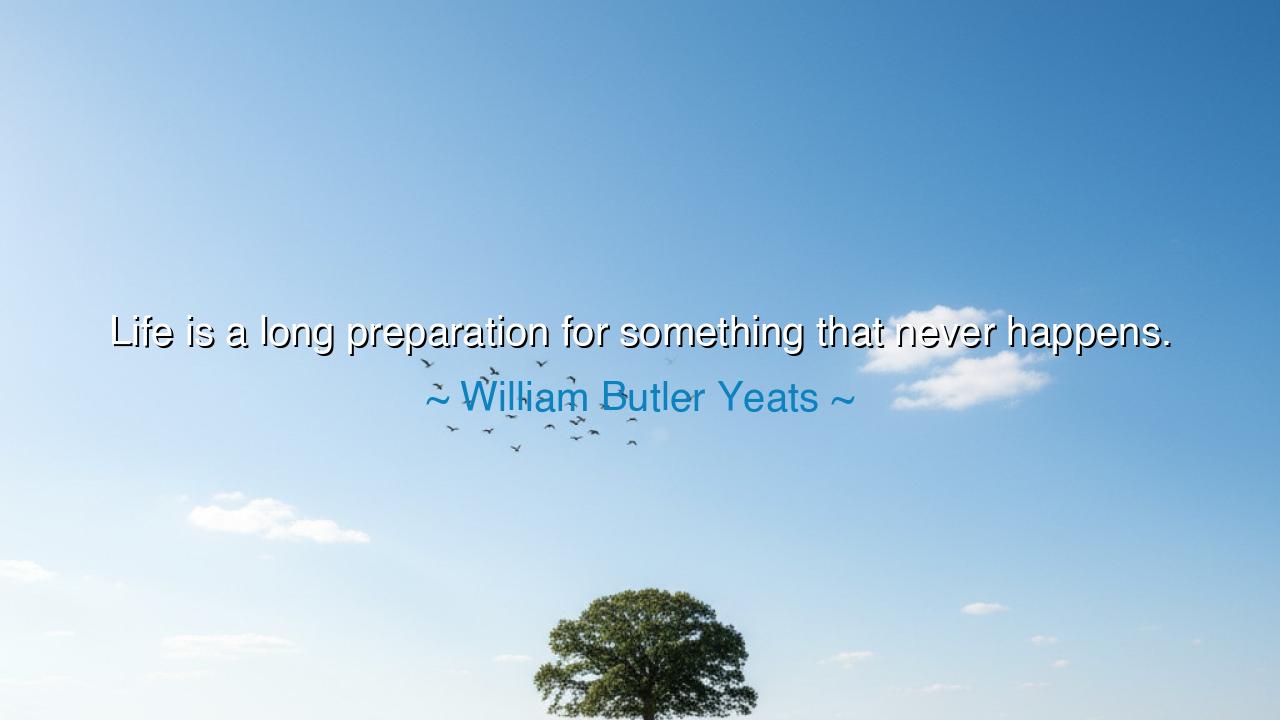
Life is a long preparation for something that never happens.






Hear now, O seekers of wisdom, the mournful yet piercing words of William Butler Yeats, poet of Ireland and dreamer of ages, who said: “Life is a long preparation for something that never happens.” These words, carved with the sharpness of truth, remind us of the endless striving of mankind—how men toil, plan, and labor for tomorrows that so often vanish like mist. Yeats, who gazed deeply into the mystery of existence, saw that much of life is spent in anticipation, in readiness for a grand fulfillment that seems always to recede, never to fully arrive.
The origin of this saying lies in the soul of Yeats himself, a man torn between the temporal and the eternal. He lived in an age of upheaval: Ireland’s struggle for freedom, the collapse of empires, the restless search for meaning in a world changing too swiftly. He himself longed for greatness, for love, for spiritual transcendence. Yet he saw that life often deceives us: we prepare for happiness, but it passes by; we prepare for triumph, yet defeat greets us; we prepare for peace, but war breaks in. Thus his words are not only poetry but confession, the cry of one who has watched human striving fall into shadows.
Consider the image. A man plants seeds, waters them, tends them year after year, dreaming of the harvest. Yet when the time comes, storms sweep it away. Was his labor wasted? Or is the meaning to be found not in the harvest, but in the labor itself? Yeats seems to say that man is forever preparing—educating, saving, striving, waiting—but the perfection he seeks is elusive. What we imagine as the ultimate arrival often never comes. Life is more about the journey of preparation than the final arrival at a destination.
History itself gives testimony. Think of Napoleon Bonaparte, who spent his whole life preparing for a destiny he believed was carved into the stars: the creation of a vast empire. He fought, he conquered, he planned endlessly, yet in the end he was exiled on a lonely rock in the sea. His grand vision never materialized. Or consider the millions who prepare for wealth, only to die before they enjoy it; or those who prepare for love, only to see it lost. Their stories reflect Yeats’s lament: that human life is often an endless rehearsal for a play that is never performed.
Yet let us not fall into despair. For within this somber truth lies a hidden treasure. If life is a long preparation, then perhaps the meaning is not in what we wait for, but in how we live while we wait. The training of the heart, the building of character, the small acts of kindness, the beauty we create—these are not wasted, even if the grand finale never comes. For the true value lies not in the imagined destination, but in the strength, wisdom, and compassion gained along the way.
The lesson is clear: do not waste your days endlessly waiting for a perfect moment that may never arrive. Live now. Embrace the preparation itself as the substance of life. Let every conversation, every task, every struggle be meaningful, not merely as a means to an end, but as an end in itself. If the great event never comes, you will not have lived in vain, for you will have lived fully in the present, not in the shadow of tomorrow.
Practical wisdom follows. Do not postpone joy, thinking it belongs only to the future. Practice gratitude for what is already before you. Pursue growth, but do not despise the small fruits of each day. And above all, remember that though the perfect fulfillment may never arrive, the journey itself—rich with lessons, love, and labor—is the true gift.
So let Yeats’s words echo within you: “Life is a long preparation for something that never happens.” But let them not bring despair. Rather, let them awaken you to the truth that the preparation is itself the essence of life, and that in walking the path with open eyes and open heart, you have already arrived at what matters most.






AAdministratorAdministrator
Welcome, honored guests. Please leave a comment, we will respond soon